It looks like you're using an Ad Blocker.
Please white-list or disable AboveTopSecret.com in your ad-blocking tool.
Thank you.
Some features of ATS will be disabled while you continue to use an ad-blocker.
share:
Alternate title: Collecting a swarm of bees.
Painfully obvious in this day and age is the decline of honey bee colonies. We had 6 hives last year, harvested 270 pounds of honey, but due to freakish weather, we lost 4 hives. Our bee inspector, who had 40 hives, was reduced to 12. A 75% percent hive loss occurred in our local.
Technically called "apiarists", beekeepers around the world monitor and share information about current trends on their hives. Not only do pesticides wipe out our hives, but odd weather patterns must get factored in when losses occur due to weather.
The beekeeper can split their hives, and make new ones, or you can buy package bees from out of state. We split two hives, and ordered two hives, from South Carolina. That brings us up to 6 again. Ok.
Someone who knows someone on Facebook posted a pic of a swarm of bees they had on the side of their house. Word got back to me, even though I'm not an avid FB user, I told them I'd collect them, only 15 miles away. Swarms are precious in these modern times, a natural split off a hive. An address later, and a short drive produced our quarry:
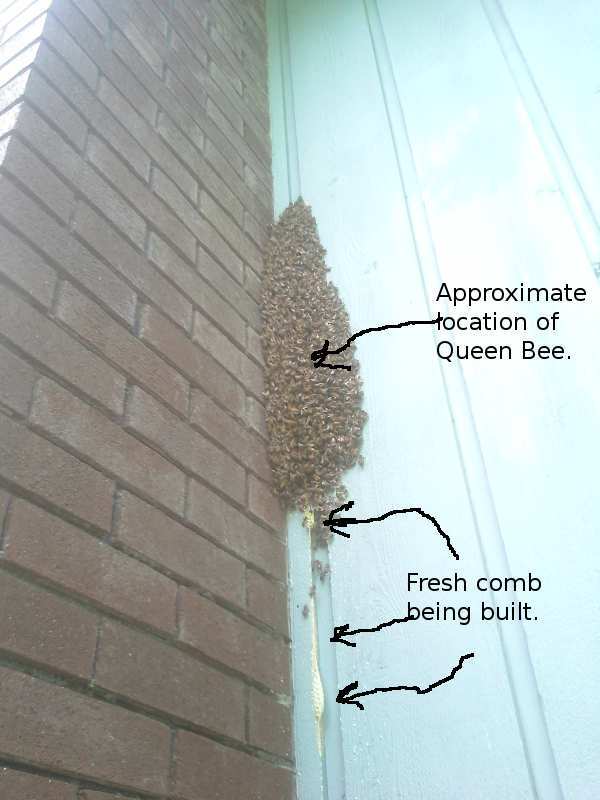
The swarm was about 12 feet up. It had been there for two days, and I was a bit surprised to see new comb being built. Nature is telling the bees to go crazy. My theory is that the bees detect the changes in the environment, and are massively reproducing to replenish themselves. Bad weather, bee loss, good weather, a genetic trigger to go crazy with reproduction.
On scene equipment:
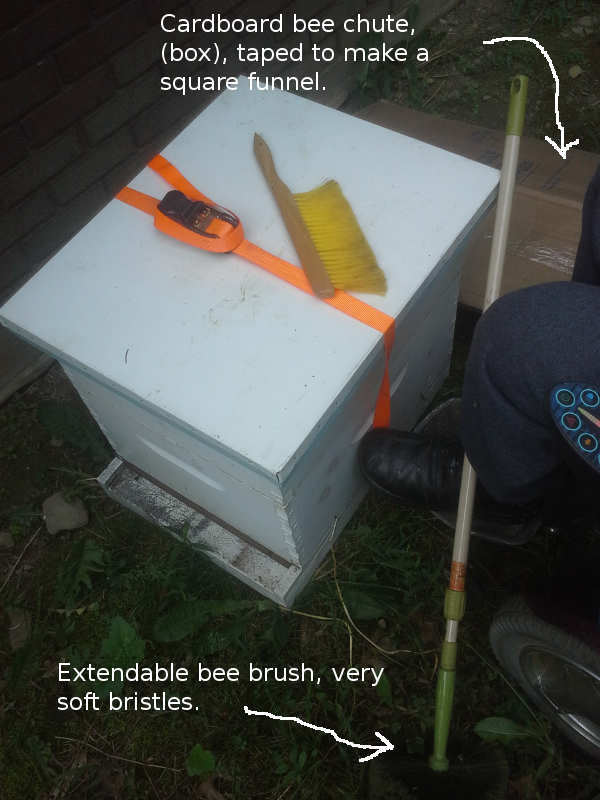
Directly before the "capture":
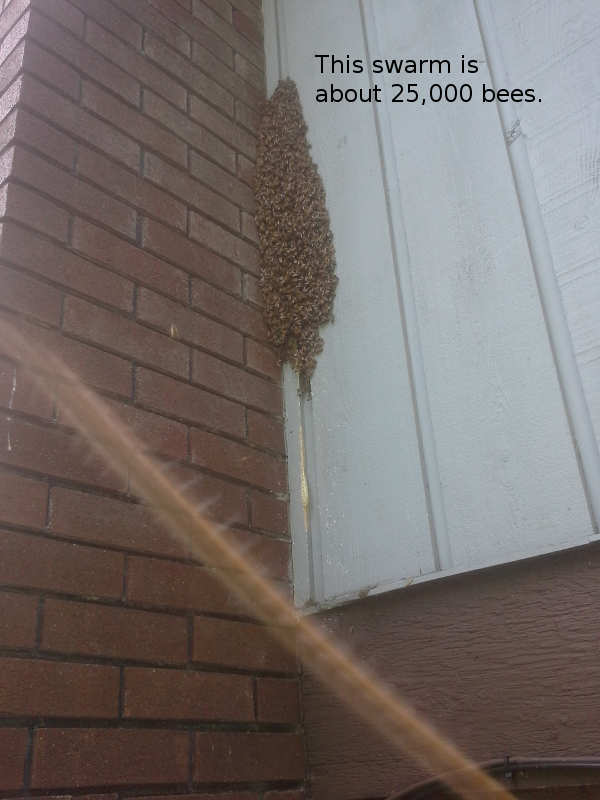
and directly after:
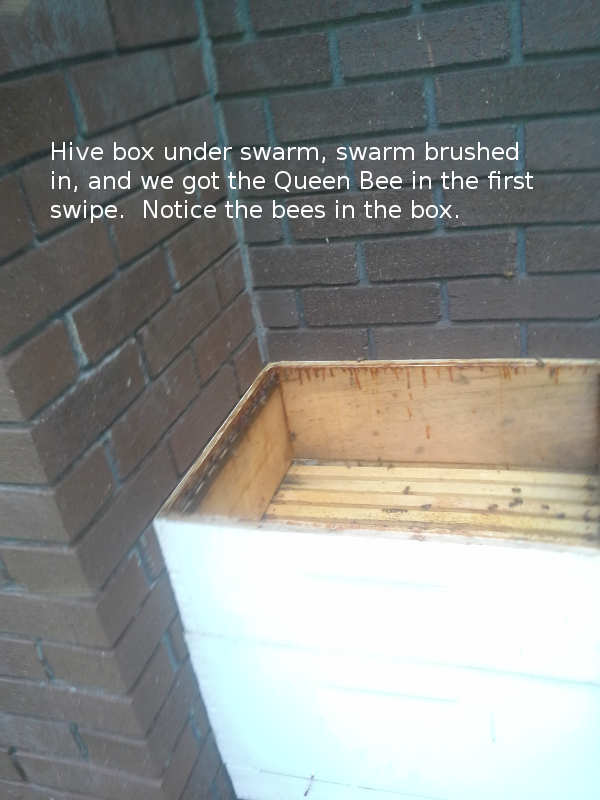
There are always a few bees that lag behind, disoriented, that can still smell the Queen's pheromones. It took an hour to slowly coax them to the direction of the Queen in the Hive Box.
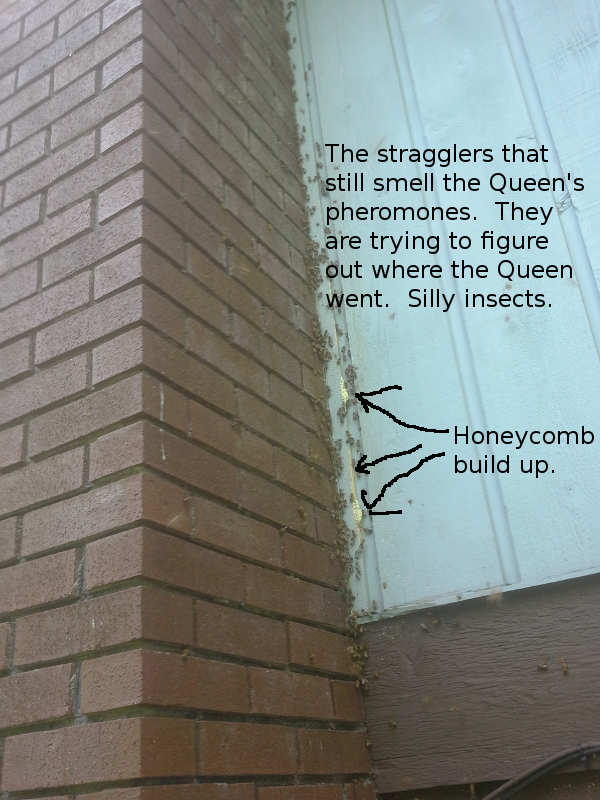
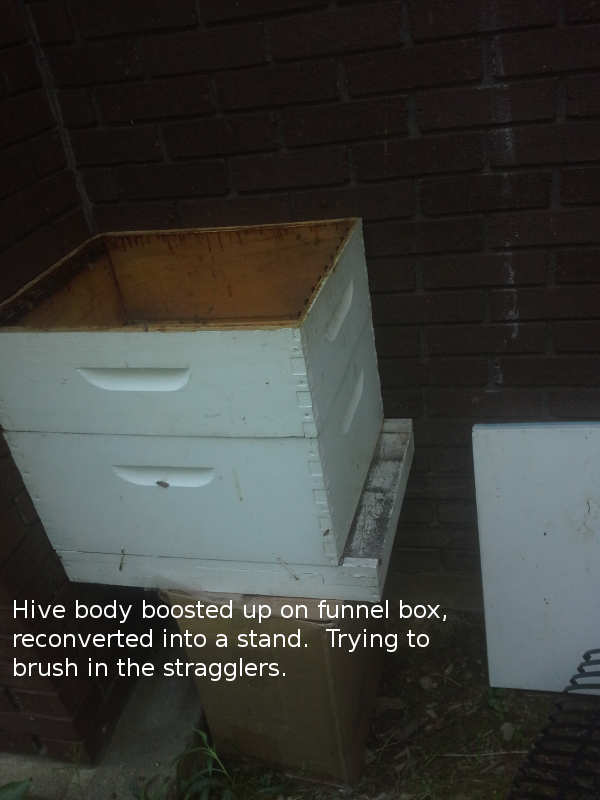
To coax the rest of the bees to the hive, we had to fire up the bee smoker, and even though I rarely use smoke on my bees, it was required in this scenario. Bees, smelling smoke, think their hive is on fire, and gorge on their honey stores, then fly away. It also screws with their radar. Smoke messes with humans, as well, bar-b-que a delicious smell, but burning tires, obnoxious. We smoked the bee brush, and kept brushing the stragglers in the hive box. We finished the collection by smoking the chimney and siding, erasing the Queen's pheromones. There were only about 20-30 bees left.
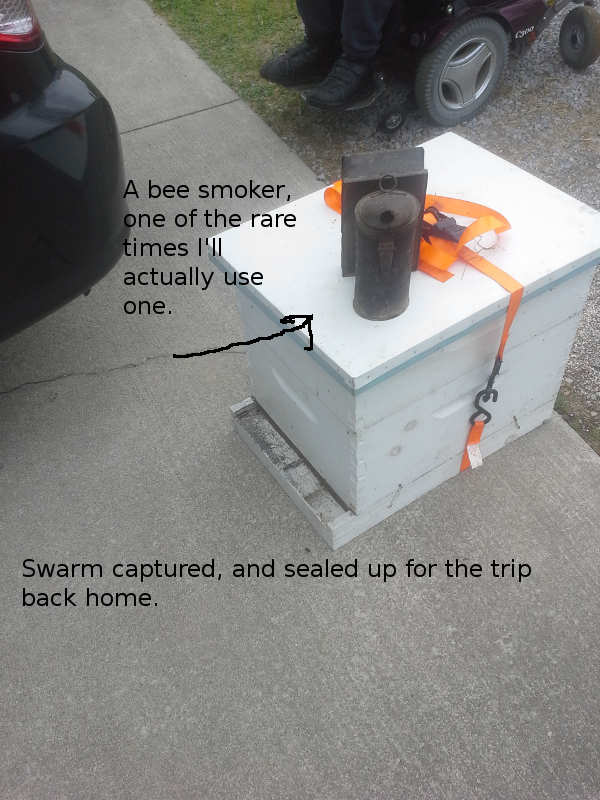
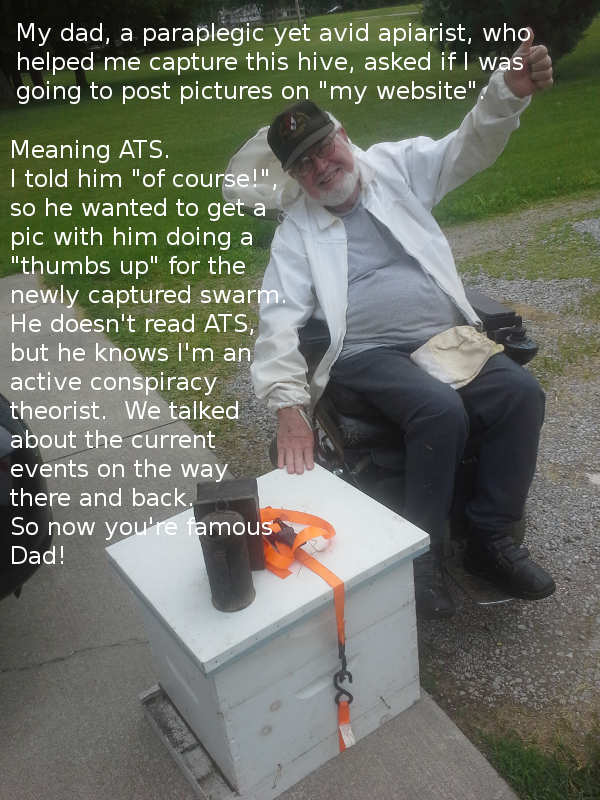
So the drive back to Dad's country hideaway was uneventful. He has 28 acres, and that's where the hives are at. And yes, as a paraplegic, he has a handicap adapted van, and a valid driver's license. He drove today, all excited to get a new hive. At that age, I guess bees are exciting!
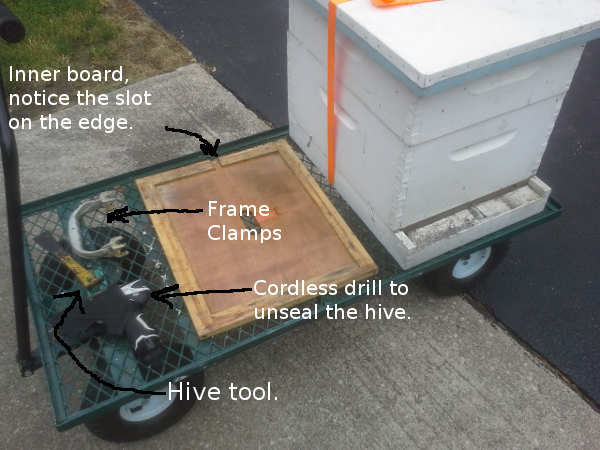
Back at his house, I loaded the new hive from the back of his van to the cart.
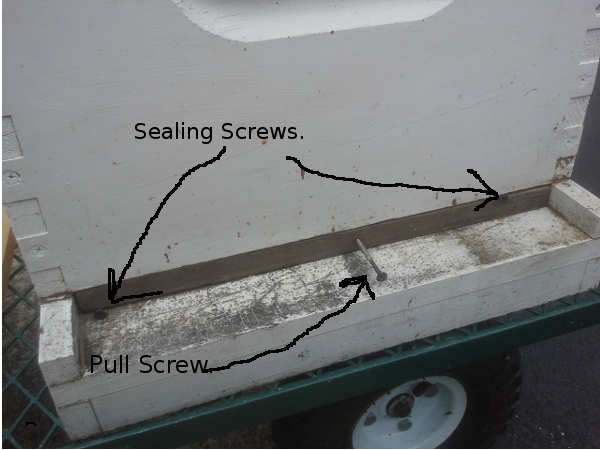
Detail of how to seal the front of the hive. Mind you it only takes 160 bee stings at once to override your nervous system and for you to go into cardiac arrest, bee venom is very toxic in large doses. You die. Bees are nothing to fool around with. If the hive came unsealed during transit, and the bees escaped, dad wouldn't have a chance against 25,000 bees by the time he transferred from the driver's seat to his wheel chair, and unloaded with his wheelchair lift.
We're experienced, no worries.
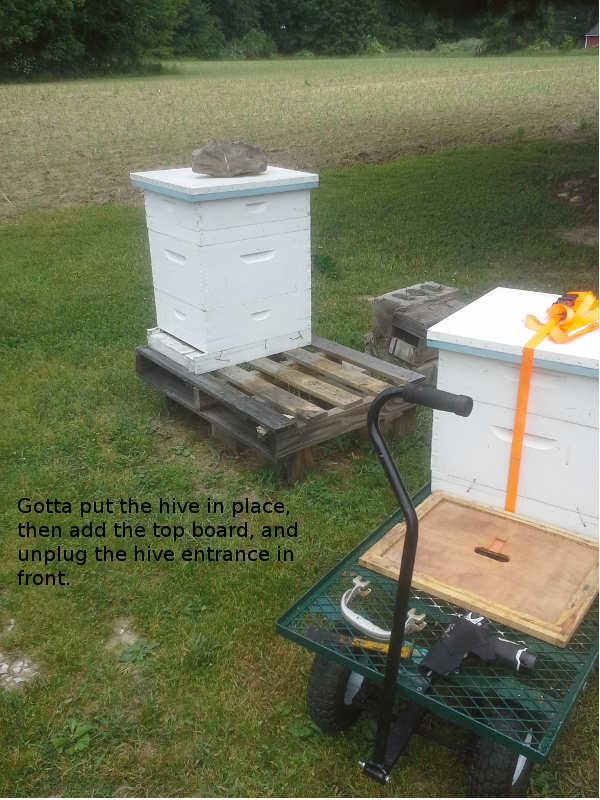
Since we lost 4 hives last year, our goal is to replenish our hives:
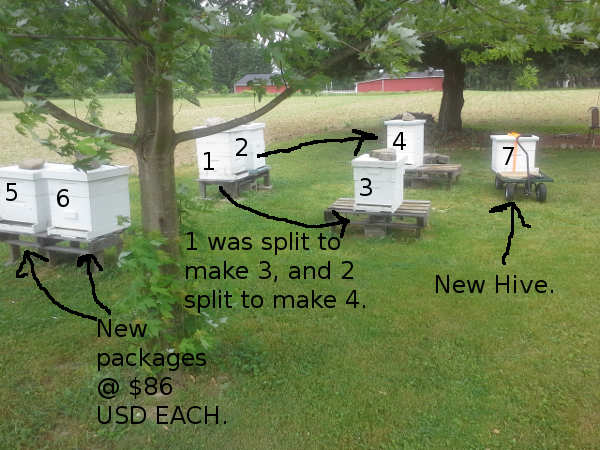
Once we had hive seven in place, we checked all the hives to see how they were doing.
Hive 7:
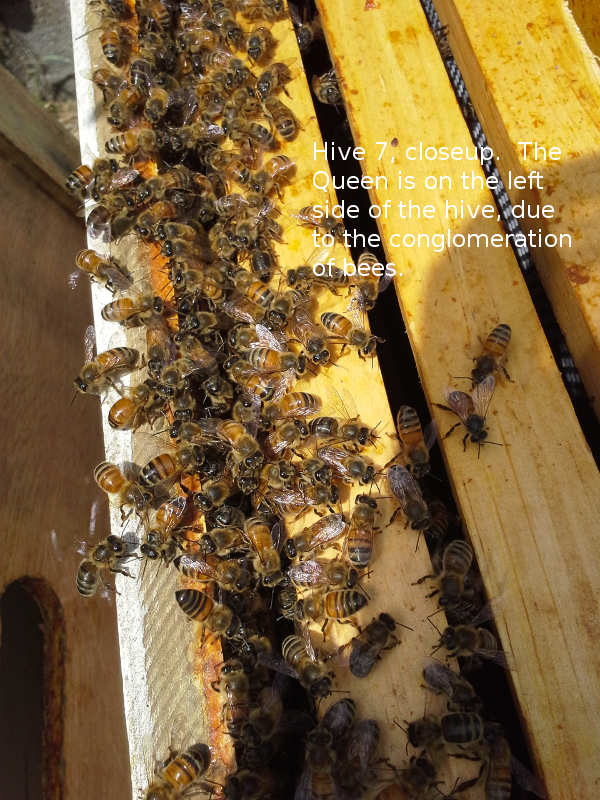
Hive 4 was a bit weak, and only worked one super, (the box of honey frames) so we decided the new hive could get the old honey frames to get them started:
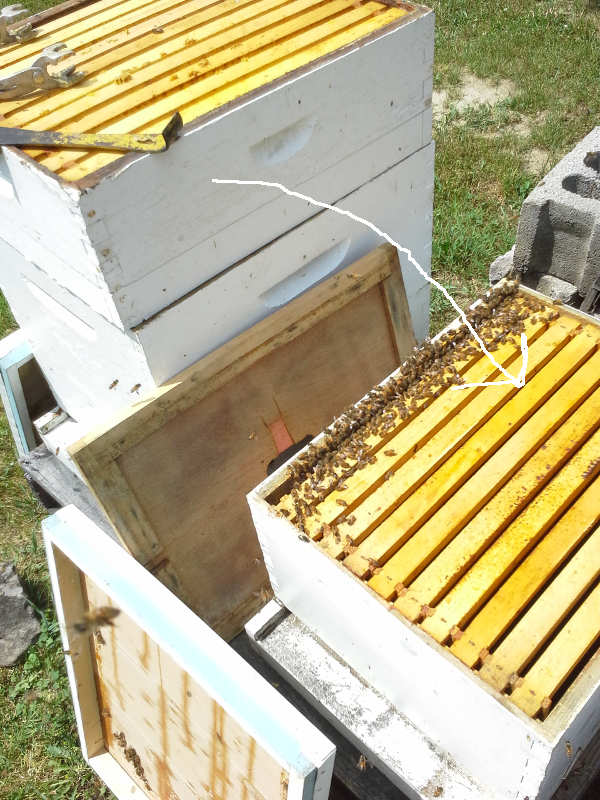
They get a variety of honey, in different stages, a perfect treat for a new hive:
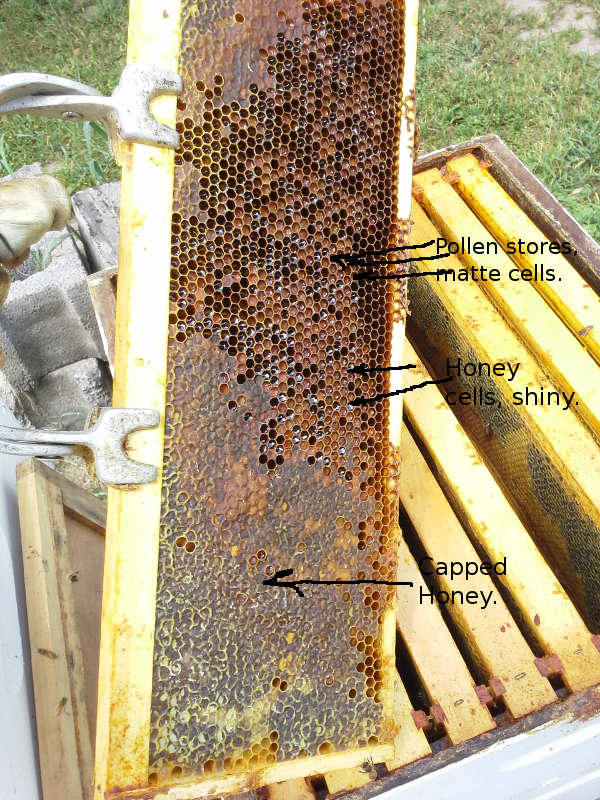
Good luck girls in Hive 7! (Yes, all those bees are female!)
We went on to inspect the other 6 hives, to check for brood. Brood are baby bees, basically, and if you have brood, you have a laying queen. Since we split hives, only one hive keeps a Queen, and the other hive has to create a new one. Since all our hives had brood:
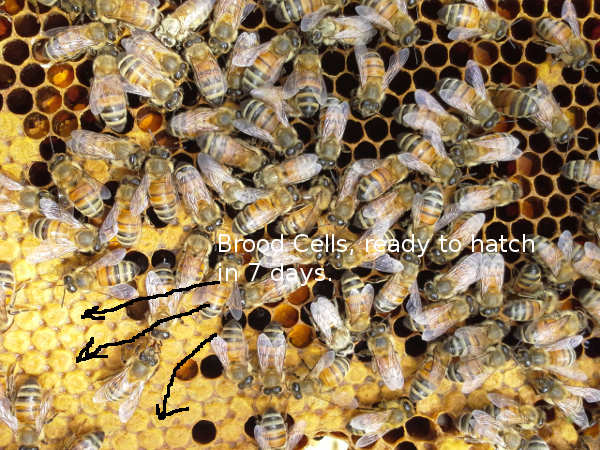
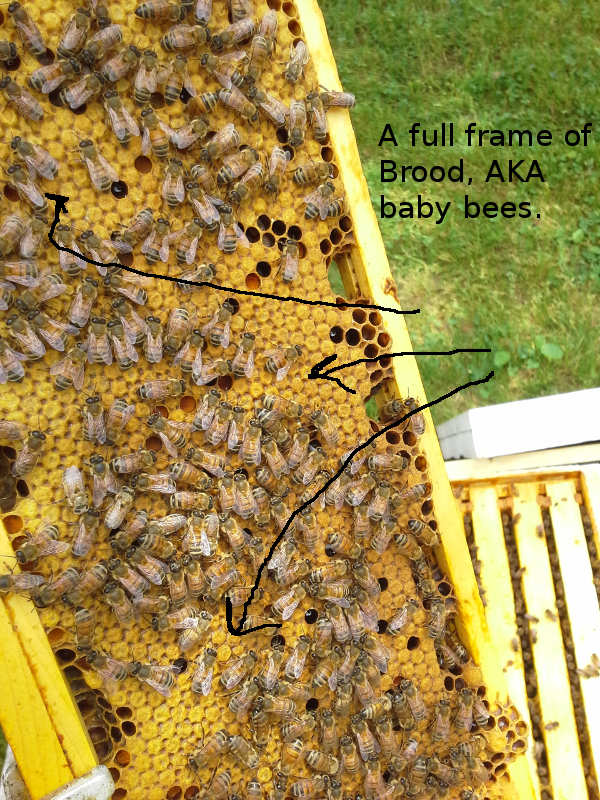
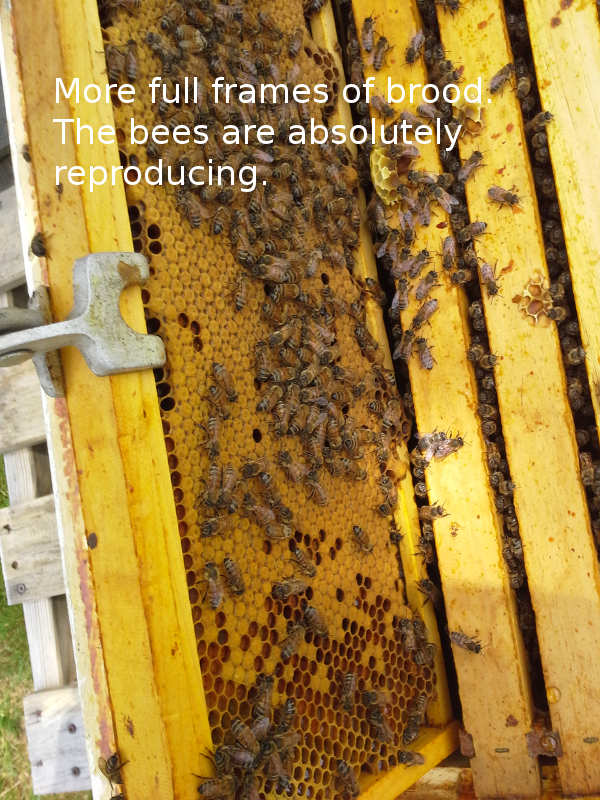
We know each of our hives have a viable Queen who is laying new eggs, and that the level of reproduction is offsetting the previous winter's losses. Locally, at least, the bees are making a comeback.
Which brings into play my previous thought:
When nature is harsh, with odd weather patterns of freezing and warming killing off our bees, they seem to respond with vigor. The bee population seems linked to the ability to recover from natural discomforts. Nature seems to balance out overall.
I wonder, often, if nature can balance out humankind.
Painfully obvious in this day and age is the decline of honey bee colonies. We had 6 hives last year, harvested 270 pounds of honey, but due to freakish weather, we lost 4 hives. Our bee inspector, who had 40 hives, was reduced to 12. A 75% percent hive loss occurred in our local.
Technically called "apiarists", beekeepers around the world monitor and share information about current trends on their hives. Not only do pesticides wipe out our hives, but odd weather patterns must get factored in when losses occur due to weather.
The beekeeper can split their hives, and make new ones, or you can buy package bees from out of state. We split two hives, and ordered two hives, from South Carolina. That brings us up to 6 again. Ok.
Someone who knows someone on Facebook posted a pic of a swarm of bees they had on the side of their house. Word got back to me, even though I'm not an avid FB user, I told them I'd collect them, only 15 miles away. Swarms are precious in these modern times, a natural split off a hive. An address later, and a short drive produced our quarry:

The swarm was about 12 feet up. It had been there for two days, and I was a bit surprised to see new comb being built. Nature is telling the bees to go crazy. My theory is that the bees detect the changes in the environment, and are massively reproducing to replenish themselves. Bad weather, bee loss, good weather, a genetic trigger to go crazy with reproduction.
On scene equipment:

Directly before the "capture":

and directly after:

There are always a few bees that lag behind, disoriented, that can still smell the Queen's pheromones. It took an hour to slowly coax them to the direction of the Queen in the Hive Box.


To coax the rest of the bees to the hive, we had to fire up the bee smoker, and even though I rarely use smoke on my bees, it was required in this scenario. Bees, smelling smoke, think their hive is on fire, and gorge on their honey stores, then fly away. It also screws with their radar. Smoke messes with humans, as well, bar-b-que a delicious smell, but burning tires, obnoxious. We smoked the bee brush, and kept brushing the stragglers in the hive box. We finished the collection by smoking the chimney and siding, erasing the Queen's pheromones. There were only about 20-30 bees left.


So the drive back to Dad's country hideaway was uneventful. He has 28 acres, and that's where the hives are at. And yes, as a paraplegic, he has a handicap adapted van, and a valid driver's license. He drove today, all excited to get a new hive. At that age, I guess bees are exciting!

Back at his house, I loaded the new hive from the back of his van to the cart.

Detail of how to seal the front of the hive. Mind you it only takes 160 bee stings at once to override your nervous system and for you to go into cardiac arrest, bee venom is very toxic in large doses. You die. Bees are nothing to fool around with. If the hive came unsealed during transit, and the bees escaped, dad wouldn't have a chance against 25,000 bees by the time he transferred from the driver's seat to his wheel chair, and unloaded with his wheelchair lift.
We're experienced, no worries.

Since we lost 4 hives last year, our goal is to replenish our hives:

Once we had hive seven in place, we checked all the hives to see how they were doing.
Hive 7:

Hive 4 was a bit weak, and only worked one super, (the box of honey frames) so we decided the new hive could get the old honey frames to get them started:

They get a variety of honey, in different stages, a perfect treat for a new hive:

Good luck girls in Hive 7! (Yes, all those bees are female!)
We went on to inspect the other 6 hives, to check for brood. Brood are baby bees, basically, and if you have brood, you have a laying queen. Since we split hives, only one hive keeps a Queen, and the other hive has to create a new one. Since all our hives had brood:



We know each of our hives have a viable Queen who is laying new eggs, and that the level of reproduction is offsetting the previous winter's losses. Locally, at least, the bees are making a comeback.
Which brings into play my previous thought:
When nature is harsh, with odd weather patterns of freezing and warming killing off our bees, they seem to respond with vigor. The bee population seems linked to the ability to recover from natural discomforts. Nature seems to balance out overall.
I wonder, often, if nature can balance out humankind.
Nice thread Druid, thanks for all the information and pictures. It makes me hopeful that all the doom threads about bees dying off might be wrong.
They are adaptable. Kudos to the person who alerted you, the person who didn't call an exterminator, but used you instead, and to you and your
famous Dad, for collecting them.
Precious pollinators for sure. Not to mention honey
Precious pollinators for sure. Not to mention honey
I would send you the ones that collect under my eaves if I could. Thousands each year. Too far away though. Bought some honey just yesterday. Small
bottle was 12.00. But it's local and I understand buying local is important. Don't know why, just told that. The maluka (sp?) from Australia is
40.00 for an even smaller jar. Thanks for keeping up our honey supplies! It's so good for you and we need our bees.
reply to post by Iamschist
The doom threads are often over hyped, but the pesticides ARE a real danger. I'm just doing part to ensure the continued survival of the Honey Bee.
The doom threads are often over hyped, but the pesticides ARE a real danger. I'm just doing part to ensure the continued survival of the Honey Bee.
reply to post by Dianec
Locally produced honey has all the allergens processed by the bees for that area. The pollen of local flora is what you breath, and to consume local honey provides you with a natural resistance to allergies.
So true that local honey is the best for you. Especially raw, unprocessed honey. If you can find a supplier, stick with them.
But, 12.00 USD for an 8 oz. bottle? That's a travesty. Around here, honey is 4.00 USd for 8 oz.
But it's local and I understand buying local is important.
Locally produced honey has all the allergens processed by the bees for that area. The pollen of local flora is what you breath, and to consume local honey provides you with a natural resistance to allergies.
So true that local honey is the best for you. Especially raw, unprocessed honey. If you can find a supplier, stick with them.
But, 12.00 USD for an 8 oz. bottle? That's a travesty. Around here, honey is 4.00 USd for 8 oz.
I'm glad you went to get the bees. If the person would have had to call an exterminator it would have been a tragic event. Hopefully the bees like
their new home. S&F for your actions, I hope your old man is proud of you.
Using local honey does seem to help my breathing. I don't use much though unless I am sick or crave it in my coffee. I like local maple syrup also, it seems to taste better.
Using local honey does seem to help my breathing. I don't use much though unless I am sick or crave it in my coffee. I like local maple syrup also, it seems to taste better.
edit on 1-6-2013 by rickymouse because: (no reason given)
Originally posted by Druid42
reply to post by Dianec
But it's local and I understand buying local is important.
Locally produced honey has all the allergens processed by the bees for that area. The pollen of local flora is what you breath, and to consume local honey provides you with a natural resistance to allergies.
So true that local honey is the best for you. Especially raw, unprocessed honey. If you can find a supplier, stick with them.
But, 12.00 USD for an 8 oz. bottle? That's a travesty. Around here, honey is 4.00 USd for 8 oz.
I have just recently gotten back into honey consumption so will be looking for a better place to buy it. The store I went to is known for organic products but way overpriced. It sure bugs me to have to exterminate bees though (dont until I have to for safety due to the kids in the neighborhood). Maybe if I do find a supplier direct situation they may do what you do. Lots of work but who knows. Good job on your part.
During the summer I go around areas -local markets And setup our booths that we have rented for the days. Markets run high here in Canada on weekends.
The discussions of course from customers, all last years we where shorter supply, and the mass bee die-offs..
our supplier Local, Had almost an 80% Reduction last year, with about the same right now. We have had much talk that hopefully this year will bring the supply up..
Id never thought id be part of something so natural and needed so highly... That too me a younger age, bee's where a pest too me...
Now i realize.. If we all dont do something around the world RIGHT NOW; We are going to see big troubles unfold slowly in a couple of years time...for all the world..
s
What you and your father are doing; Is such a help - The small Catalytic effect turns too the biggest demand for our survival. Props to your Dad and yourself!
The discussions of course from customers, all last years we where shorter supply, and the mass bee die-offs..
our supplier Local, Had almost an 80% Reduction last year, with about the same right now. We have had much talk that hopefully this year will bring the supply up..
Id never thought id be part of something so natural and needed so highly... That too me a younger age, bee's where a pest too me...
Now i realize.. If we all dont do something around the world RIGHT NOW; We are going to see big troubles unfold slowly in a couple of years time...for all the world..
s
What you and your father are doing; Is such a help - The small Catalytic effect turns too the biggest demand for our survival. Props to your Dad and yourself!
Originally posted by Druid42
The doom threads are often over hyped, but the pesticides ARE a real danger. I'm just doing part to ensure the continued survival of the Honey Bee.
Great thread Druid, really outstanding. I love the pics,
and kudos to you and Dad!
Cool post! Thanks for the pics on how to reclaim a swarming hive. Here it's a bit different as you have to first spot the domestic bees from the
native ones, and then follow them to their new hive.
Do you collect the pollen much? I have seen it done with a couple of brushes at the entrance of the hive, that will scrape off the pollen from the bees legs as they enter the hive.
Is it also true they relieve themselves (insect poop/piss) before landing to the hive? I have heard that lol
Do you collect the pollen much? I have seen it done with a couple of brushes at the entrance of the hive, that will scrape off the pollen from the bees legs as they enter the hive.
Is it also true they relieve themselves (insect poop/piss) before landing to the hive? I have heard that lol
At last, some great photos posted and something really worthwhile to put them to.
Many thanks and keep up the good work.
We love bees.
Many thanks and keep up the good work.
We love bees.
Wow Druid, in these scary times for bees and subsequently anything that relies on pollinating for it's food sources, that makes you and your dad
hero's. It's so comforting to know that there are both, people willing to look to a keeper rather than an exterminator and people willing to come
out and get a swarm. I'm so happy that there are people like you and your dad in the world.
reply to post by Druid42
Awesome! Thanks for the thread, druid, it made me smile.
I also appreciate the informative pictures and your explanations, very educational!
Keep it up, you are doing a great thing for this planet by taking care of these bees, if they go extinct so will we.
Awesome! Thanks for the thread, druid, it made me smile.
I also appreciate the informative pictures and your explanations, very educational!
Keep it up, you are doing a great thing for this planet by taking care of these bees, if they go extinct so will we.
reply to post by Druid42
That is really really cool.
Thanks for sharing it.
I have yet to see any honey bees so far this year in northern VA, a bunch of bumble bees and hornets and wasps, but no honey bees yet.
That is really really cool.
Thanks for sharing it.
I have yet to see any honey bees so far this year in northern VA, a bunch of bumble bees and hornets and wasps, but no honey bees yet.
I can only echo what others have said.
A great job and a great service you and your father are providing
A great job and a great service you and your father are providing
reply to post by Druid42
Enjoyed the story mate, S+F, I'm glad your dad is now famous also
Nature is an amazing thing but sometimes I wonder if people have gone beyond the bounds of being helped
Enjoyed the story mate, S+F, I'm glad your dad is now famous also
Nature is an amazing thing but sometimes I wonder if people have gone beyond the bounds of being helped
Excellent thread, Druid!
This is by far on of the better write-ups to read lately!
The bees need to make a comeback because they are tremendously important.
I was actually wanting to start keeping a couple hives myself, and wondered how difficult and how much maintenance was involved so this helps a good bit.
I'm off to do more research!
This is by far on of the better write-ups to read lately!
The bees need to make a comeback because they are tremendously important.
I was actually wanting to start keeping a couple hives myself, and wondered how difficult and how much maintenance was involved so this helps a good bit.
I'm off to do more research!
We have had a honeybee hive in the northern wall of our house for two years now. This spring they have sent out 6 swarms!! It has been truly
unbelievable, the amount of bees that have come pouring out of this hive!
We have never disturbed the bees because they are so vital to our garden and crops in this area. We have learned to just live with them peacefully. We do get the occasional sting, but only if a bee happens to get stuck in your hair or crushed when you unknowingly sit on one. They do get in the house and we have to take a cup and catch and release them outside.
The funny thing is, the bees chose a spot in our wall that is right behind our internet antenna and they come and go in the crack where our fireplace chimney meets the outer wall. I guess they like the frequency and the warmth during the winter!!!
We have never disturbed the bees because they are so vital to our garden and crops in this area. We have learned to just live with them peacefully. We do get the occasional sting, but only if a bee happens to get stuck in your hair or crushed when you unknowingly sit on one. They do get in the house and we have to take a cup and catch and release them outside.
The funny thing is, the bees chose a spot in our wall that is right behind our internet antenna and they come and go in the crack where our fireplace chimney meets the outer wall. I guess they like the frequency and the warmth during the winter!!!
Ah, the great family of Hymenoptera! I don't keep bees, but ants. Eusocial insects have been a fascination for me since I was young. I've always
wanted to start up an apiary to complement my formicaria and natural myrmecophile tendencies, but they are a bit pricey to start up. Maybe in the
future.
Glad to see your bees are doing well. Good luck to the girls in all of your hives.
Glad to see your bees are doing well. Good luck to the girls in all of your hives.
reply to post by Druid42
Great thread....fantastic pics! S & F
Really loved the photos....a really informative 'play by play' description....give your Dad a thumbs up from us!
I would love to have some bees....but my husband and son are allergic to stings. I do respect the visitors to my garden tho....and try to plant some flowering treats just for them. I have noticed that they often head off in the same direction, so perhaps I have a neighbor who does have hives.
Great thread....fantastic pics! S & F
Really loved the photos....a really informative 'play by play' description....give your Dad a thumbs up from us!
I would love to have some bees....but my husband and son are allergic to stings. I do respect the visitors to my garden tho....and try to plant some flowering treats just for them. I have noticed that they often head off in the same direction, so perhaps I have a neighbor who does have hives.
new topics
-
Meadows, Giuliani Among 11 Indicted in Arizona in Latest 2020 Election Subversion Case
Mainstream News: 6 minutes ago -
Massachusetts Drag Queen Leads Young Kids in Free Palestine Chant
Social Issues and Civil Unrest: 21 minutes ago -
Weinstein's conviction overturned
Mainstream News: 1 hours ago -
Supreme Court Oral Arguments 4.25.2024 - Are PRESIDENTS IMMUNE From Later Being Prosecuted.
Above Politics: 3 hours ago -
Krystalnacht on today's most elite Universities?
Social Issues and Civil Unrest: 3 hours ago -
Chris Christie Wishes Death Upon Trump and Ramaswamy
Politicians & People: 3 hours ago -
University of Texas Instantly Shuts Down Anti Israel Protests
Education and Media: 5 hours ago -
Any one suspicious of fever promotions events, major investor Goldman Sachs card only.
The Gray Area: 8 hours ago
top topics
-
VP's Secret Service agent brawls with other agents at Andrews
Mainstream News: 16 hours ago, 11 flags -
Krystalnacht on today's most elite Universities?
Social Issues and Civil Unrest: 3 hours ago, 7 flags -
Nearly 70% Of Americans Want Talks To End War In Ukraine
Political Issues: 17 hours ago, 6 flags -
Weinstein's conviction overturned
Mainstream News: 1 hours ago, 6 flags -
Sunak spinning the sickness figures
Other Current Events: 17 hours ago, 5 flags -
Electrical tricks for saving money
Education and Media: 15 hours ago, 5 flags -
Supreme Court Oral Arguments 4.25.2024 - Are PRESIDENTS IMMUNE From Later Being Prosecuted.
Above Politics: 3 hours ago, 5 flags -
University of Texas Instantly Shuts Down Anti Israel Protests
Education and Media: 5 hours ago, 3 flags -
Any one suspicious of fever promotions events, major investor Goldman Sachs card only.
The Gray Area: 8 hours ago, 2 flags -
Chris Christie Wishes Death Upon Trump and Ramaswamy
Politicians & People: 3 hours ago, 1 flags
active topics
-
University of Texas Instantly Shuts Down Anti Israel Protests
Education and Media • 120 • : cherokeetroy -
Candidate TRUMP Now Has Crazy Judge JUAN MERCHAN After Him - The Stormy Daniels Hush-Money Case.
Political Conspiracies • 752 • : Vermilion -
VP's Secret Service agent brawls with other agents at Andrews
Mainstream News • 48 • : 5thHead -
-@TH3WH17ERABB17- -Q- ---TIME TO SHOW THE WORLD--- -Part- --44--
Dissecting Disinformation • 673 • : Thoughtful3 -
SETI chief says US has no evidence for alien technology. 'And we never have'
Aliens and UFOs • 66 • : SchrodingersRat -
Weinstein's conviction overturned
Mainstream News • 14 • : Encia22 -
Meadows, Giuliani Among 11 Indicted in Arizona in Latest 2020 Election Subversion Case
Mainstream News • 0 • : IndieA -
Nearly 70% Of Americans Want Talks To End War In Ukraine
Political Issues • 83 • : SchrodingersRat -
Supreme Court Oral Arguments 4.25.2024 - Are PRESIDENTS IMMUNE From Later Being Prosecuted.
Above Politics • 43 • : RazorV66 -
"We're All Hamas" Heard at Columbia University Protests
Social Issues and Civil Unrest • 284 • : 5thHead
